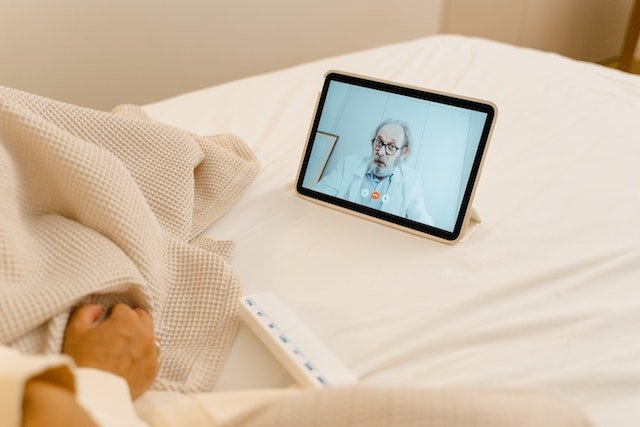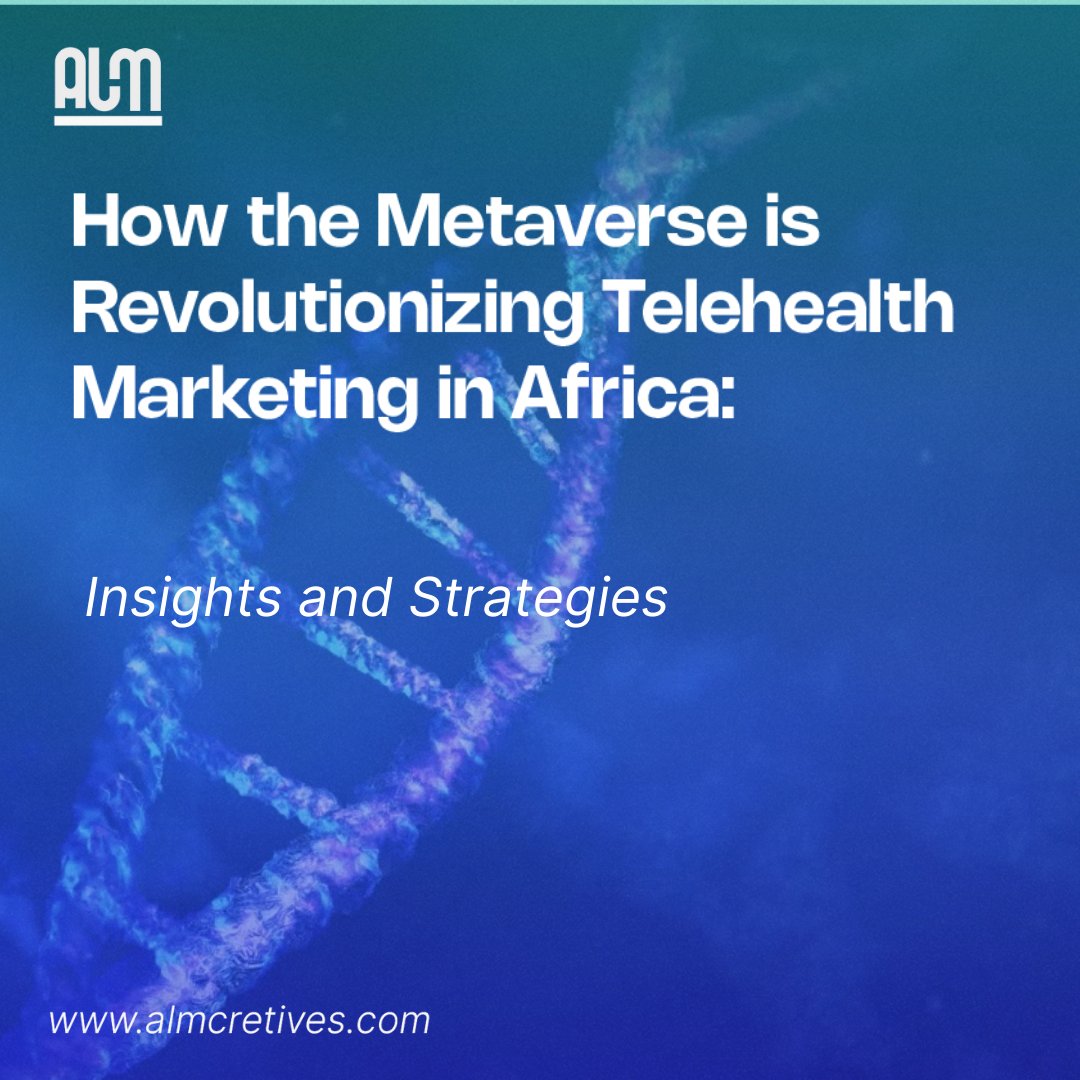Search
How the Metaverse is Revolutionizing Telehealth Marketing in Africa: Insights and Strategies
Business and advices
The metaverse is a virtual world that is being built on the foundations of augmented reality (AR), virtual reality (VR), and the internet. It is a place where people can interact with each other and with digital content in a way that is more immersive and interactive than ever before.
The metaverse has the potential to revolutionize the way we interact with the world around us. It could also have a significant impact on the healthcare industry. For example, the metaverse could be used to provide telehealth services in a more immersive and engaging way.
Africa is a continent with a rapidly growing population and a growing demand for healthcare services. However, many people in Africa do not have access to traditional healthcare services. The metaverse could help to bridge this gap by providing telehealth services to people in remote areas.
There are a number of ways that telehealth providers can use the metaverse to market their services in Africa. For example, they could create virtual waiting rooms where patients could wait to be seen by a doctor. They could also create virtual examination rooms where patients could be seen by a doctor in real time.
In addition, the metaverse could be used to provide educational content about telehealth. For example, providers could create virtual classrooms where patients could learn about the benefits of telehealth and how to use it.
In the paragraph below we are going to discuss the benefits of using the metaverse for telehealth in Africa.
Benefits of Using the Metaverse for Telehealth in Africa

In Africa, where access to healthcare services is often limited, utilizing the Metaverse for telehealth holds great potential for transforming healthcare delivery. This section explores the benefits of using the Metaverse for telehealth in Africa and highlights some pertinent points.
1. Increased access to healthcare:
One of the primary advantages of utilizing the Metaverse for telehealth in Africa is the enhanced access to healthcare services it offers.
Many regions in Africa face challenges such as long distances to healthcare facilities and a shortage of medical professionals. By leveraging the Metaverse, individuals in remote areas can connect with healthcare providers virtually, bridging the gap between patients and doctors.
This can greatly improve access to medical advice, diagnosis, and treatment, particularly for those who previously had limited or no access to healthcare services.
2. Reduced costs:
The implementation of telehealth services through the Metaverse can lead to cost savings for both patients and healthcare providers.
Virtual consultations eliminate the need for physical travel, reducing transportation costs and saving valuable time.
Additionally, the scalability of telehealth in the Metaverse allows healthcare professionals to serve a larger number of patients simultaneously, optimizing their time and resources.
This cost-effectiveness can make healthcare more affordable and accessible, particularly for low-income individuals who struggle with financial barriers to medical care.
3. Data Collection and Analysis:
The utilization of the Metaverse for telehealth in Africa allows for the collection and analysis of valuable healthcare data.
By integrating digital health records and wearable devices with telehealth platforms, healthcare providers can gather real-time health data, monitor patient progress, and identify trends or patterns.
This data-driven approach can aid in early detection of diseases, personalized treatment planning, and population health management.
Furthermore, aggregated and anonymized data can be utilized for research purposes, enabling the development of tailored healthcare solutions for specific African populations.
4. Enhanced education:
The Metaverse offers a unique platform for health education and awareness campaigns in Africa.
Virtual environments can be designed to simulate real-life scenarios and provide interactive educational content on various health topics.
This approach can empower individuals to make informed decisions about their health, promote preventive measures, and raise awareness about diseases and available treatments.
By leveraging the immersive and engaging nature of the Metaverse, health education initiatives can effectively reach a wide audience and contribute to better overall health outcomes.
Addressing Challenges for Full Adoption of the Metaverse in Telehealth Marketing in Africa

Although using the Metaverse to promote healthcare services and reach a wider audience holds tremendous potential, there are several challenges that must be addressed before the full adoption of the Metaverse in telehealth marketing can be realized. These challenges include:
1. Limited Connectivity:
One of the primary challenges facing the adoption of the Metaverse in telehealth marketing is the limited internet connectivity in many parts of Africa.
Reliable and high-speed internet access is essential for a seamless and immersive experience within the virtual realm. Unfortunately, connectivity issues persist in rural and underserved areas, hindering widespread adoption.
To address this challenge, efforts must be made to expand internet infrastructure and improve accessibility, ensuring that even remote communities can benefit from the potential of the Metaverse.
2. Digital Divide:
The digital divide, characterized by unequal access to digital technologies, remains a significant obstacle in Africa.
Disparities in smartphone ownership, access to devices, and digital literacy can create barriers to the adoption of the Metaverse for telehealth marketing.
Bridging the digital divide requires comprehensive initiatives that focus on improving digital literacy, providing affordable devices, and promoting inclusive access to technology.
Such efforts are crucial to ensure that all segments of society can participate and benefit from telehealth marketing in the Metaverse.
3. Privacy and security:
Building trust in the Metaverse is crucial for its acceptance as a platform for telehealth marketing. Concerns about privacy, data security, and the misuse of personal information are prevalent among users.
It is essential for telehealth providers and Metaverse platforms to prioritize user data protection, adopt stringent security measures, and adhere to ethical data practices. Transparent information sharing and clear consent processes can help alleviate concerns and establish trust.
Additionally, educating users about the benefits and safeguards in place within the Metaverse can help dispel misconceptions and encourage greater adoption.
Despite these challenges, the metaverse has the potential to revolutionize the way telehealth is marketed in Africa. As the metaverse continues to develop, it is likely that we will see more and more telehealth providers using it to reach patients in Africa.
INSIGHTS AND STRATEGIES
Here are some insights and strategies for using the metaverse to market telehealth in Africa:
1. Focus on education:
The metaverse can be used to provide educational content about telehealth, which can help to increase awareness and adoption. This content can be created in a variety of formats, such as virtual classrooms, interactive games, and educational videos.
2. Use immersive experiences:
The metaverse can be used to create immersive experiences that can help patients to feel more connected to their providers. This can be done by creating virtual waiting rooms, examination rooms, and even surgical theaters.
3. Partner with local organizations:
Partnering with local organizations can help to increase the reach of telehealth marketing campaigns. These organizations can help to promote telehealth services to their members and communities.
4. Keep up with the latest trends:
The metaverse is constantly evolving, so it is important to keep up with the latest trends. This will help to ensure that your marketing campaigns are effective and relevant.
CONCLUSION
While the Metaverse holds immense potential for telehealth marketing in Africa, several challenges must be addressed for its full adoption.
By actively addressing these challenges, stakeholders in the healthcare industry, technology companies, policymakers, and communities can unlock the transformative power of the Metaverse, revolutionizing telehealth marketing in Africa and improving access to healthcare services for all.




